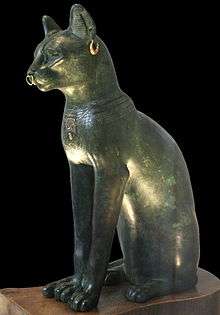mjw
Egyptian

Etymology 1
Most likely onomatopoeic, from the animal’s cry (meow). Compare Chinese 貓 (māo), Lao ແມວ (mǣu).
Other hypotheses connect it to Proto-Afro-Asiatic *m-r or *m-l, the former on the basis of Alagwa mariy-amo (“wild cat”), Lamé Ngete mēr (“serval”) and méríán (“wild cat”), Pévé merian (“wild cat, serval”), Zime-Dari Pévé mīēr (“genette”), and the latter on the basis of Musgu ámíl (“African civet”), Bedanga Sokoro melā (“cat”). Either one of these could also be plausibly connected with the ancestor of Egyptian mꜣj (“lion”).
Pronunciation
- (reconstructed Old Egyptian) IPA(key): /mi(ʀ)juw/
- (modern Egyptological) IPA(key): /miuː/
- Conventional anglicization: miu
Noun
m
- (male) cat; tomcat
- c. 332-30 BCE,, Book of the Dead of Iuefankh, chapter 17, lines 45-46 (pTurin Museo Egizio 1791):
![W24 [nw]](../I/m/hiero_W24.png%3F55bf4.svg)
![V31 [k]](../I/m/hiero_V31.png%3F70ebb.svg)

![W19 [mi]](../I/m/hiero_W19.png%3Fc9d92.svg)
![M17 [i]](../I/m/hiero_M17.png%3F2e70b.svg)
![G43 [w]](../I/m/hiero_G43.png%3F6eb40.svg)

![Q3 [p]](../I/m/hiero_Q3.png%3F42130.svg)
![I9 [f]](../I/m/hiero_I9.png%3Ffe540.svg)
![M17 [i]](../I/m/hiero_M17.png%3F2e70b.svg)
![M17 [i]](../I/m/hiero_M17.png%3F2e70b.svg)
![O29 [aA]](../I/m/hiero_O29.png%3F3e0b0.svg)
![D36 [a]](../I/m/hiero_D36.png%3F9d512.svg)

![N35 [n]](../I/m/hiero_N35.png%3Ffcc27.svg)
![X1 [t]](../I/m/hiero_X1.png%3Ff2a8c.svg)
![Z4 [y]](../I/m/hiero_Z4.png%3Fdbdf8.svg)
![D2 [Hr]](../I/m/hiero_D2.png%3Fa7a01.svg)

![Q3 [p]](../I/m/hiero_Q3.png%3F42130.svg)
![N37 [S]](../I/m/hiero_N37.png%3F33374.svg)
![X1 [t]](../I/m/hiero_X1.png%3Ff2a8c.svg)

![M17 [i]](../I/m/hiero_M17.png%3F2e70b.svg)
![N37 [S]](../I/m/hiero_N37.png%3F33374.svg)
![D46 [d]](../I/m/hiero_D46.png%3F1dee4.svg)

![D21 [r]](../I/m/hiero_D21.png%3F9bfb9.svg)


![I9 [f]](../I/m/hiero_I9.png%3Ffe540.svg)
![Aa13 [im]](../I/m/hiero_Aa13.png%3F4d8fd.svg)
![O28 [iwn]](../I/m/hiero_O28.png%3F4910a.svg)
![W24 [nw]](../I/m/hiero_W24.png%3F55bf4.svg)
![O49 [niwt]](../I/m/hiero_O49.png%3Fdd778.svg)
![W11 [g]](../I/m/hiero_W11.png%3Fe5e65.svg)
![D21 [r]](../I/m/hiero_D21.png%3F9bfb9.svg)
![V28 [H]](../I/m/hiero_V28.png%3Ff1179.svg)
![G43 [w]](../I/m/hiero_G43.png%3F6eb40.svg)

![N5 [ra]](../I/m/hiero_N5.png%3F08eb7.svg)

![Q3 [p]](../I/m/hiero_Q3.png%3F42130.svg)
![I9 [f]](../I/m/hiero_I9.png%3Ffe540.svg)
![M17 [i]](../I/m/hiero_M17.png%3F2e70b.svg)
![M17 [i]](../I/m/hiero_M17.png%3F2e70b.svg)
![N35 [n]](../I/m/hiero_N35.png%3Ffcc27.svg)
![D34 [aHA]](../I/m/hiero_D34.png%3F5faef.svg)


![D36 [a]](../I/m/hiero_D36.png%3F9d512.svg)

![D4 [ir]](../I/m/hiero_D4.png%3Fe1f5d.svg)
![X1 [t]](../I/m/hiero_X1.png%3Ff2a8c.svg)

![G1 [A]](../I/m/hiero_G1.png%3F4d556.svg)
![Z7 [W]](../I/m/hiero_Z7.png%3Ffc6fb.svg)

![S29 [s]](../I/m/hiero_S29.png%3F58979.svg)
![D58 [b]](../I/m/hiero_D58.png%3F12f84.svg)
![M17 [i]](../I/m/hiero_M17.png%3F2e70b.svg)
![G43 [w]](../I/m/hiero_G43.png%3F6eb40.svg)


![O4 [h]](../I/m/hiero_O4.png%3F2d920.svg)
![D21 [r]](../I/m/hiero_D21.png%3F9bfb9.svg)
![G43 [w]](../I/m/hiero_G43.png%3F6eb40.svg)
![N5 [ra]](../I/m/hiero_N5.png%3F08eb7.svg)

![Q3 [p]](../I/m/hiero_Q3.png%3F42130.svg)
![I9 [f]](../I/m/hiero_I9.png%3Ffe540.svg)
![M17 [i]](../I/m/hiero_M17.png%3F2e70b.svg)
![M17 [i]](../I/m/hiero_M17.png%3F2e70b.svg)
![N35 [n]](../I/m/hiero_N35.png%3Ffcc27.svg)
![V28 [H]](../I/m/hiero_V28.png%3Ff1179.svg)
![Q1 [st]](../I/m/hiero_Q1.png%3F30a23.svg)
![G17 [m]](../I/m/hiero_G17.png%3F3741e.svg)
![G38 [gb]](../I/m/hiero_G38.png%3Fe0ffb.svg)
![X1 [t]](../I/m/hiero_X1.png%3Ff2a8c.svg)
![G37 [nDs]](../I/m/hiero_G37.png%3Fab9e8.svg)



![W24 [nw]](../I/m/hiero_W24.png%3F55bf4.svg)

![V30 [nb]](../I/m/hiero_V30.png%3Fe0ed0.svg)
![M36 [Dr]](../I/m/hiero_M36.png%3Fd6431.svg)
![D21 [r]](../I/m/hiero_D21.png%3F9bfb9.svg)

![M17 [i]](../I/m/hiero_M17.png%3F2e70b.svg)
![G17 [m]](../I/m/hiero_G17.png%3F3741e.svg)
![I9 [f]](../I/m/hiero_I9.png%3Ffe540.svg)
- jnk mjw pfy ꜥꜣ ntj ḥr p(s)št jšd r-gs.f m jwnw grḥ pfy n(j) ꜥḥꜣ-ꜥ(w) jrt zꜣw(t) sbjw
hrw pfy n(j) ḥtmt ḫftjw nw nb-(r)-ḏr jm.f - I am that great tomcat beside whom the desert date tree was split in Heliopolis on that night of battle and the guarding of rebels,
on that day on which the enemies of the Lord of All were destroyed.
- jnk mjw pfy ꜥꜣ ntj ḥr p(s)št jšd r-gs.f m jwnw grḥ pfy n(j) ꜥḥꜣ-ꜥ(w) jrt zꜣw(t) sbjw
- c. 332-30 BCE,, Book of the Dead of Iuefankh, chapter 17, lines 45-46 (pTurin Museo Egizio 1791):
Inflection
Declension of mjw (masculine)
| singular | mjw | |||||||
|---|---|---|---|---|---|---|---|---|
| dual | mjwwj | |||||||
| plural | mjww |
Alternative forms
Alternative hieroglyphic writings of mjw
| mjw |
Derived terms
- mjwt (“female cat”)
Descendants
Inflection
Declension of mjw (masculine)
| singular | mjw |
|---|---|
| dual | mjwwj |
| plural | mjww |
Derived terms
References
- Takács, Gábor (2007), “mj.w & mj.t”, in Etymological Dictionary of Egyptian, volume 3, Leiden: Brill, →ISBN, page 134
- James P[eter] Allen (2010) Middle Egyptian: An Introduction to the Language and Culture of Hieroglyphs, 2nd edition, Cambridge: Cambridge University Press, →ISBN, page 376.
This article is issued from
Wiktionary.
The text is licensed under Creative
Commons - Attribution - Sharealike.
Additional terms may apply for the media files.